Financial Planning Practice (Assessment 2)
VerifiedAdded on 2022/12/27
|7
|1898
|56
AI Summary
This document provides a practice assessment on financial planning, covering topics such as suitability report and risk profiling, income and expenditure analysis, life time cash flows, scenario analysis and recommendations. It offers expert guidance and suggestions for effective financial planning.
Contribute Materials
Your contribution can guide someone’s learning journey. Share your
documents today.
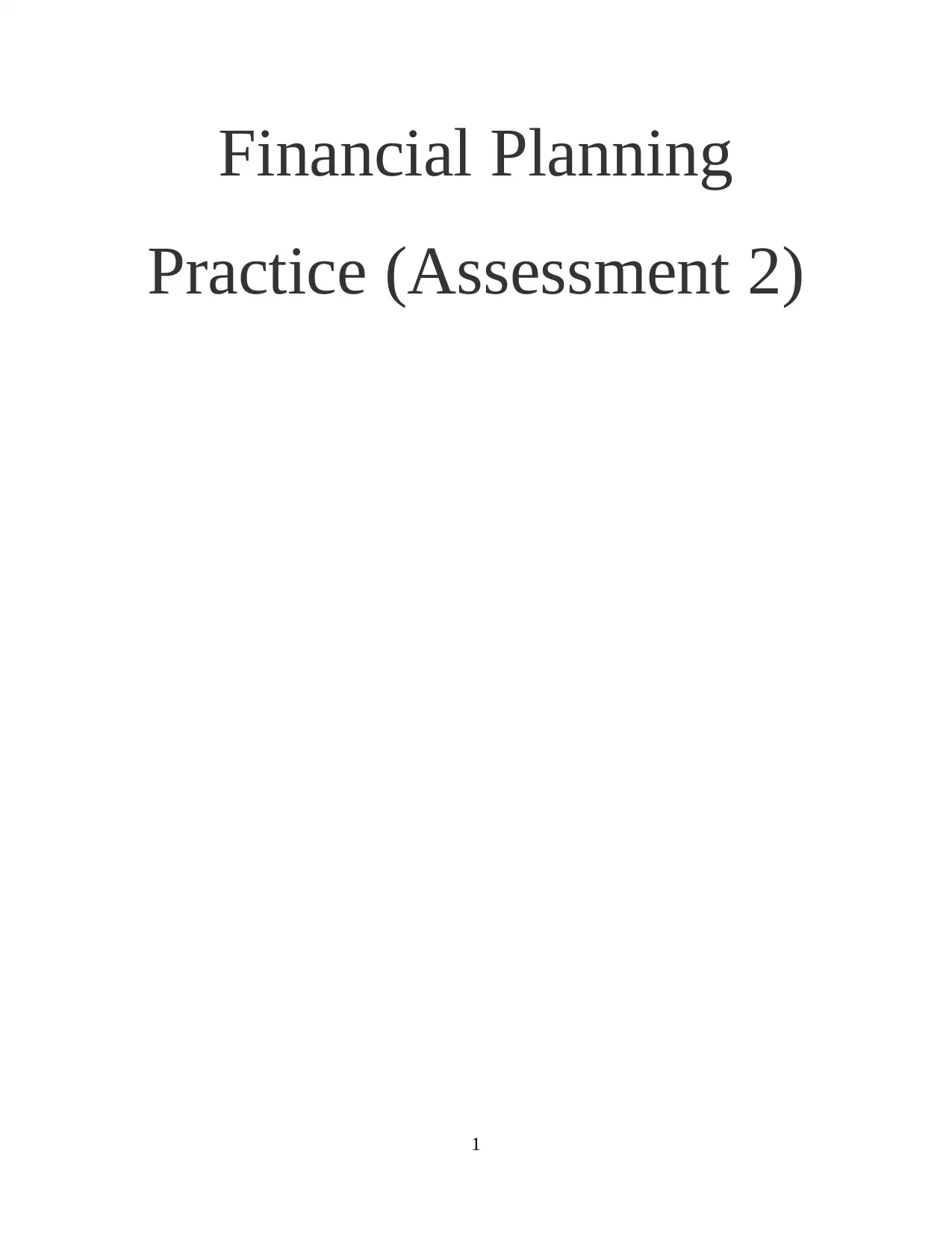
Financial Planning
Practice (Assessment 2)
1
Practice (Assessment 2)
1
Secure Best Marks with AI Grader
Need help grading? Try our AI Grader for instant feedback on your assignments.
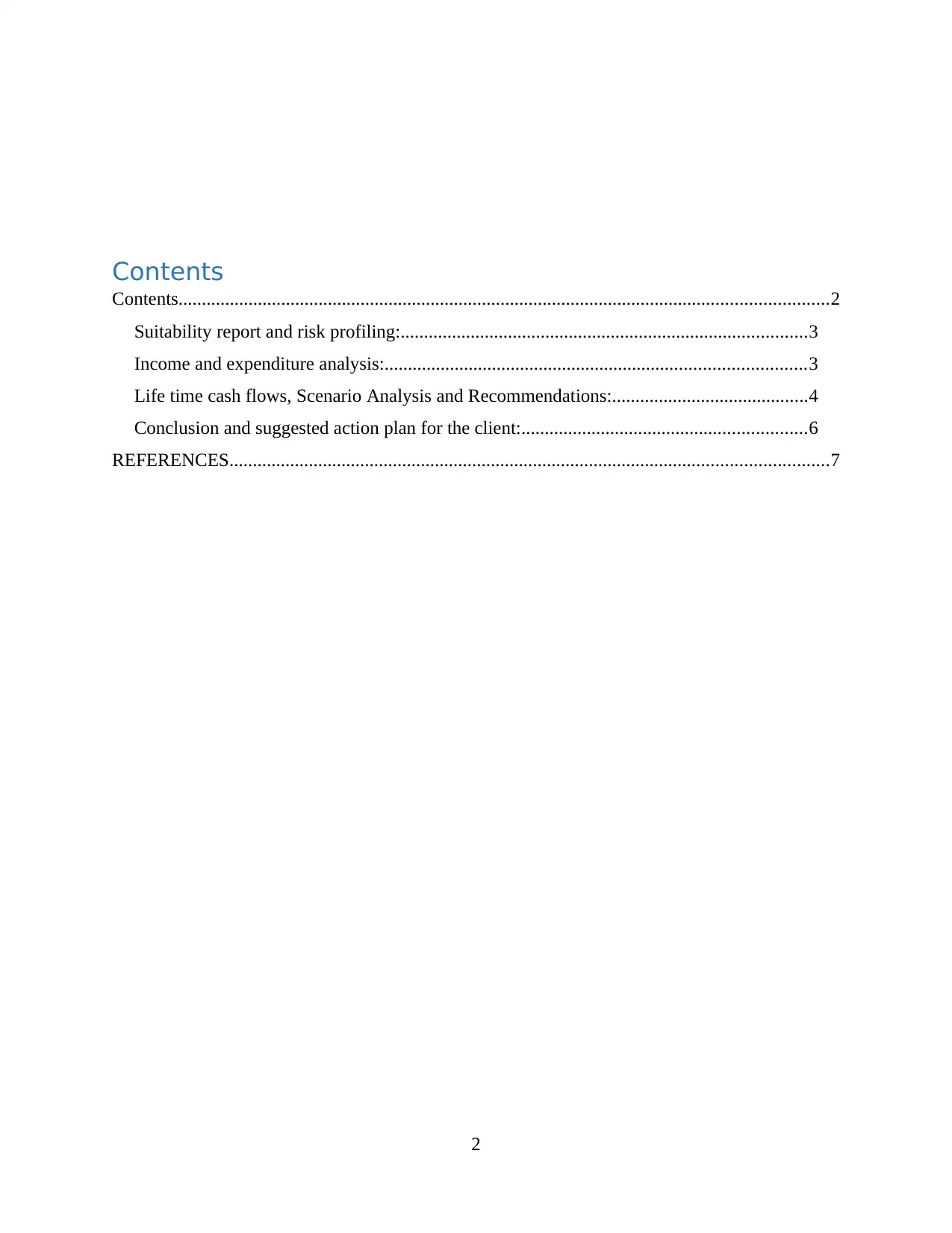
Contents
Contents...........................................................................................................................................2
Suitability report and risk profiling:.......................................................................................3
Income and expenditure analysis:..........................................................................................3
Life time cash flows, Scenario Analysis and Recommendations:..........................................4
Conclusion and suggested action plan for the client:.............................................................6
REFERENCES................................................................................................................................7
2
Contents...........................................................................................................................................2
Suitability report and risk profiling:.......................................................................................3
Income and expenditure analysis:..........................................................................................3
Life time cash flows, Scenario Analysis and Recommendations:..........................................4
Conclusion and suggested action plan for the client:.............................................................6
REFERENCES................................................................................................................................7
2
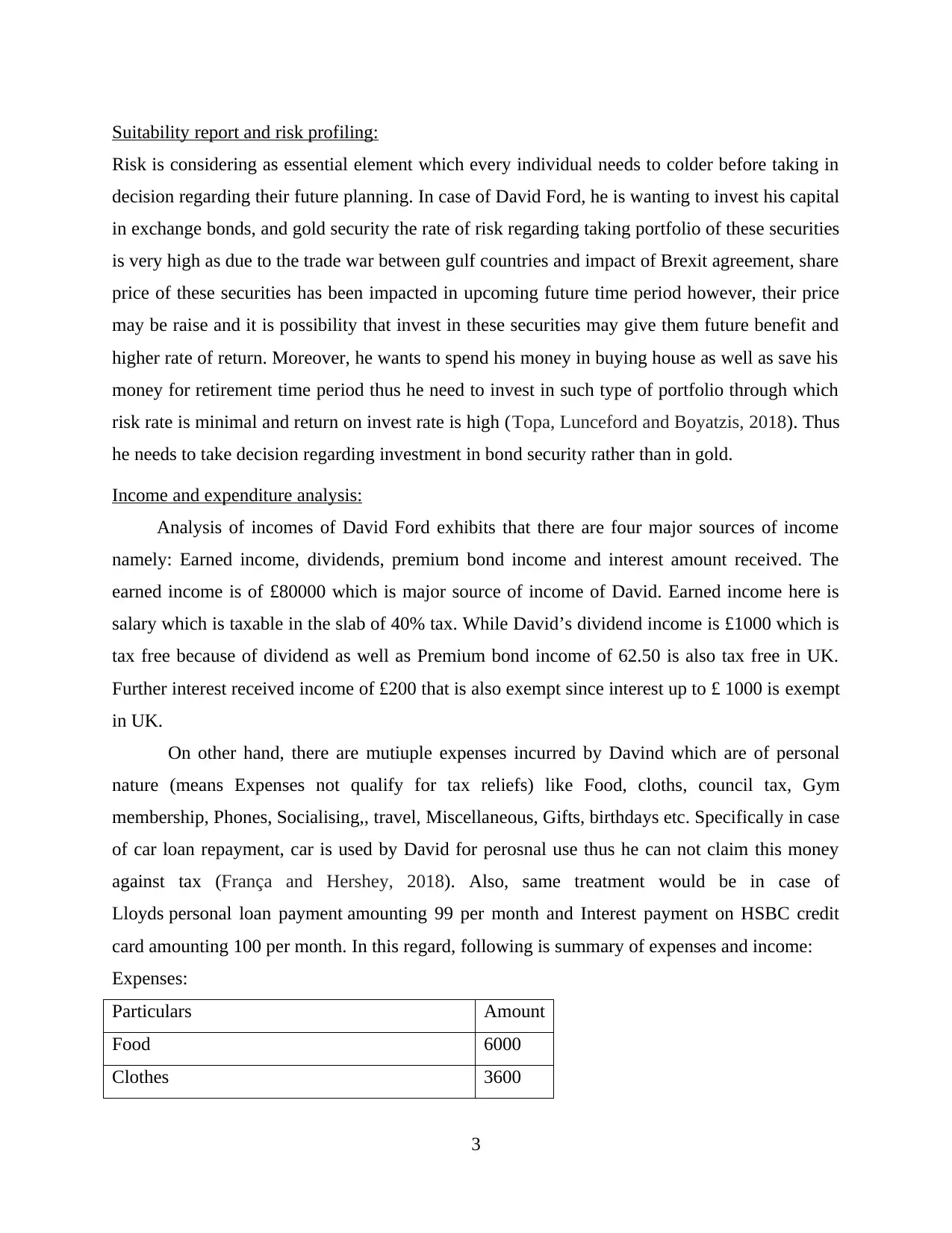
Suitability report and risk profiling:
Risk is considering as essential element which every individual needs to colder before taking in
decision regarding their future planning. In case of David Ford, he is wanting to invest his capital
in exchange bonds, and gold security the rate of risk regarding taking portfolio of these securities
is very high as due to the trade war between gulf countries and impact of Brexit agreement, share
price of these securities has been impacted in upcoming future time period however, their price
may be raise and it is possibility that invest in these securities may give them future benefit and
higher rate of return. Moreover, he wants to spend his money in buying house as well as save his
money for retirement time period thus he need to invest in such type of portfolio through which
risk rate is minimal and return on invest rate is high (Topa, Lunceford and Boyatzis, 2018). Thus
he needs to take decision regarding investment in bond security rather than in gold.
Income and expenditure analysis:
Analysis of incomes of David Ford exhibits that there are four major sources of income
namely: Earned income, dividends, premium bond income and interest amount received. The
earned income is of £80000 which is major source of income of David. Earned income here is
salary which is taxable in the slab of 40% tax. While David’s dividend income is £1000 which is
tax free because of dividend as well as Premium bond income of 62.50 is also tax free in UK.
Further interest received income of £200 that is also exempt since interest up to £ 1000 is exempt
in UK.
On other hand, there are mutiuple expenses incurred by Davind which are of personal
nature (means Expenses not qualify for tax reliefs) like Food, cloths, council tax, Gym
membership, Phones, Socialising,, travel, Miscellaneous, Gifts, birthdays etc. Specifically in case
of car loan repayment, car is used by David for perosnal use thus he can not claim this money
against tax (França and Hershey, 2018). Also, same treatment would be in case of
Lloyds personal loan payment amounting 99 per month and Interest payment on HSBC credit
card amounting 100 per month. In this regard, following is summary of expenses and income:
Expenses:
Particulars Amount
Food 6000
Clothes 3600
3
Risk is considering as essential element which every individual needs to colder before taking in
decision regarding their future planning. In case of David Ford, he is wanting to invest his capital
in exchange bonds, and gold security the rate of risk regarding taking portfolio of these securities
is very high as due to the trade war between gulf countries and impact of Brexit agreement, share
price of these securities has been impacted in upcoming future time period however, their price
may be raise and it is possibility that invest in these securities may give them future benefit and
higher rate of return. Moreover, he wants to spend his money in buying house as well as save his
money for retirement time period thus he need to invest in such type of portfolio through which
risk rate is minimal and return on invest rate is high (Topa, Lunceford and Boyatzis, 2018). Thus
he needs to take decision regarding investment in bond security rather than in gold.
Income and expenditure analysis:
Analysis of incomes of David Ford exhibits that there are four major sources of income
namely: Earned income, dividends, premium bond income and interest amount received. The
earned income is of £80000 which is major source of income of David. Earned income here is
salary which is taxable in the slab of 40% tax. While David’s dividend income is £1000 which is
tax free because of dividend as well as Premium bond income of 62.50 is also tax free in UK.
Further interest received income of £200 that is also exempt since interest up to £ 1000 is exempt
in UK.
On other hand, there are mutiuple expenses incurred by Davind which are of personal
nature (means Expenses not qualify for tax reliefs) like Food, cloths, council tax, Gym
membership, Phones, Socialising,, travel, Miscellaneous, Gifts, birthdays etc. Specifically in case
of car loan repayment, car is used by David for perosnal use thus he can not claim this money
against tax (França and Hershey, 2018). Also, same treatment would be in case of
Lloyds personal loan payment amounting 99 per month and Interest payment on HSBC credit
card amounting 100 per month. In this regard, following is summary of expenses and income:
Expenses:
Particulars Amount
Food 6000
Clothes 3600
3
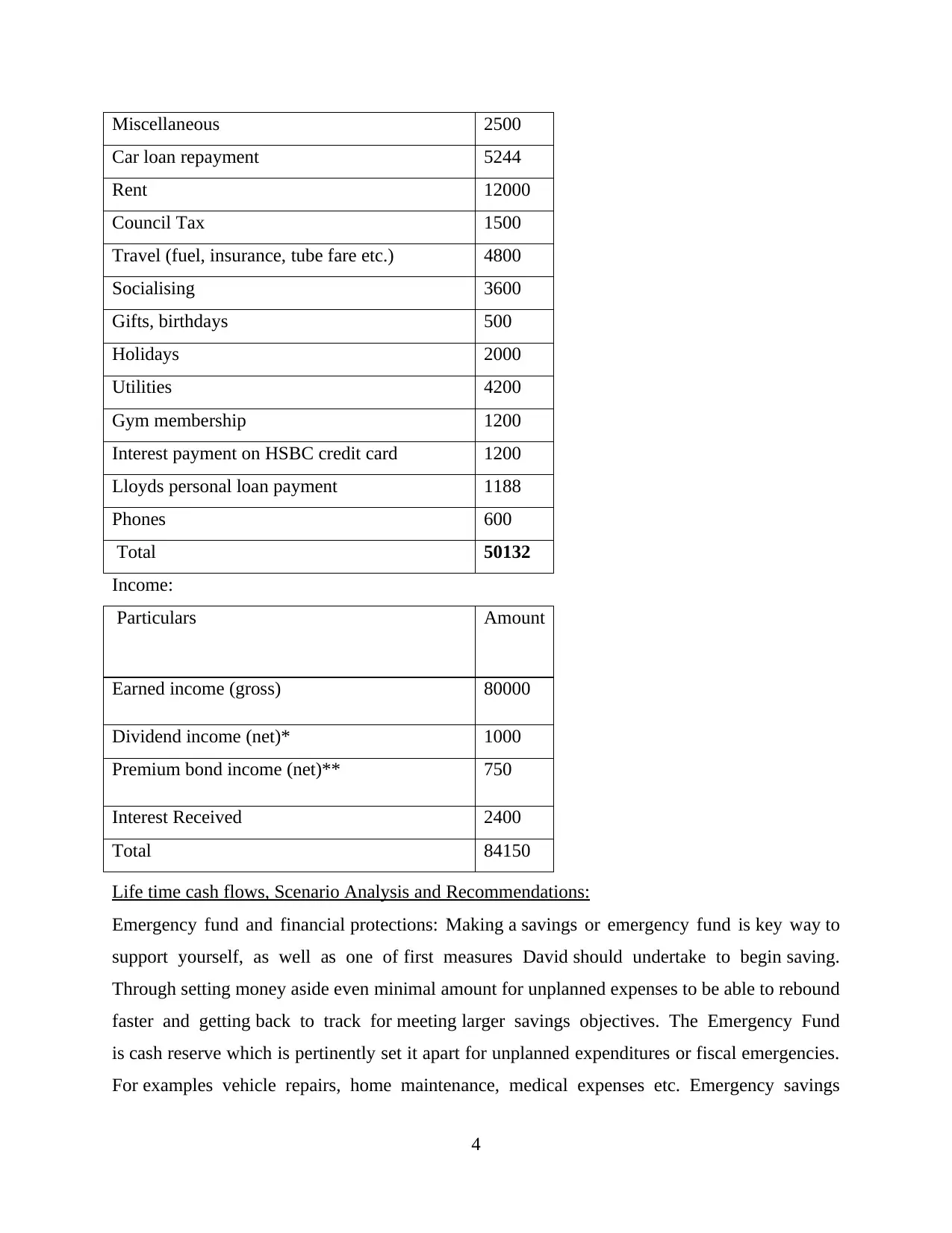
Miscellaneous 2500
Car loan repayment 5244
Rent 12000
Council Tax 1500
Travel (fuel, insurance, tube fare etc.) 4800
Socialising 3600
Gifts, birthdays 500
Holidays 2000
Utilities 4200
Gym membership 1200
Interest payment on HSBC credit card 1200
Lloyds personal loan payment 1188
Phones 600
Total 50132
Income:
Particulars Amount
Earned income (gross) 80000
Dividend income (net)* 1000
Premium bond income (net)** 750
Interest Received 2400
Total 84150
Life time cash flows, Scenario Analysis and Recommendations:
Emergency fund and financial protections: Making a savings or emergency fund is key way to
support yourself, as well as one of first measures David should undertake to begin saving.
Through setting money aside even minimal amount for unplanned expenses to be able to rebound
faster and getting back to track for meeting larger savings objectives. The Emergency Fund
is cash reserve which is pertinently set it apart for unplanned expenditures or fiscal emergencies.
For examples vehicle repairs, home maintenance, medical expenses etc. Emergency savings
4
Car loan repayment 5244
Rent 12000
Council Tax 1500
Travel (fuel, insurance, tube fare etc.) 4800
Socialising 3600
Gifts, birthdays 500
Holidays 2000
Utilities 4200
Gym membership 1200
Interest payment on HSBC credit card 1200
Lloyds personal loan payment 1188
Phones 600
Total 50132
Income:
Particulars Amount
Earned income (gross) 80000
Dividend income (net)* 1000
Premium bond income (net)** 750
Interest Received 2400
Total 84150
Life time cash flows, Scenario Analysis and Recommendations:
Emergency fund and financial protections: Making a savings or emergency fund is key way to
support yourself, as well as one of first measures David should undertake to begin saving.
Through setting money aside even minimal amount for unplanned expenses to be able to rebound
faster and getting back to track for meeting larger savings objectives. The Emergency Fund
is cash reserve which is pertinently set it apart for unplanned expenditures or fiscal emergencies.
For examples vehicle repairs, home maintenance, medical expenses etc. Emergency savings
4
Secure Best Marks with AI Grader
Need help grading? Try our AI Grader for instant feedback on your assignments.
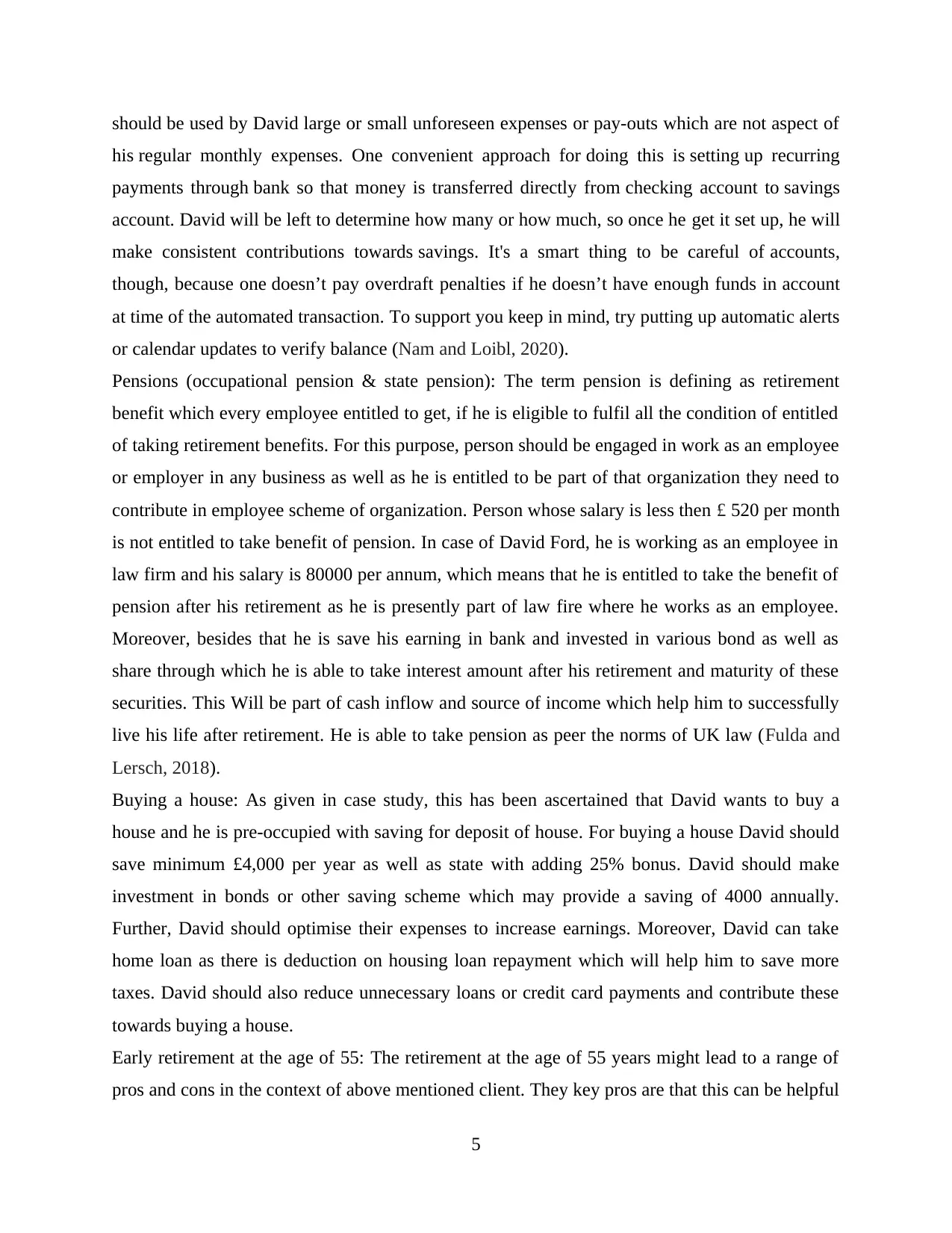
should be used by David large or small unforeseen expenses or pay-outs which are not aspect of
his regular monthly expenses. One convenient approach for doing this is setting up recurring
payments through bank so that money is transferred directly from checking account to savings
account. David will be left to determine how many or how much, so once he get it set up, he will
make consistent contributions towards savings. It's a smart thing to be careful of accounts,
though, because one doesn’t pay overdraft penalties if he doesn’t have enough funds in account
at time of the automated transaction. To support you keep in mind, try putting up automatic alerts
or calendar updates to verify balance (Nam and Loibl, 2020).
Pensions (occupational pension & state pension): The term pension is defining as retirement
benefit which every employee entitled to get, if he is eligible to fulfil all the condition of entitled
of taking retirement benefits. For this purpose, person should be engaged in work as an employee
or employer in any business as well as he is entitled to be part of that organization they need to
contribute in employee scheme of organization. Person whose salary is less then £ 520 per month
is not entitled to take benefit of pension. In case of David Ford, he is working as an employee in
law firm and his salary is 80000 per annum, which means that he is entitled to take the benefit of
pension after his retirement as he is presently part of law fire where he works as an employee.
Moreover, besides that he is save his earning in bank and invested in various bond as well as
share through which he is able to take interest amount after his retirement and maturity of these
securities. This Will be part of cash inflow and source of income which help him to successfully
live his life after retirement. He is able to take pension as peer the norms of UK law (Fulda and
Lersch, 2018).
Buying a house: As given in case study, this has been ascertained that David wants to buy a
house and he is pre-occupied with saving for deposit of house. For buying a house David should
save minimum £4,000 per year as well as state with adding 25% bonus. David should make
investment in bonds or other saving scheme which may provide a saving of 4000 annually.
Further, David should optimise their expenses to increase earnings. Moreover, David can take
home loan as there is deduction on housing loan repayment which will help him to save more
taxes. David should also reduce unnecessary loans or credit card payments and contribute these
towards buying a house.
Early retirement at the age of 55: The retirement at the age of 55 years might lead to a range of
pros and cons in the context of above mentioned client. They key pros are that this can be helpful
5
his regular monthly expenses. One convenient approach for doing this is setting up recurring
payments through bank so that money is transferred directly from checking account to savings
account. David will be left to determine how many or how much, so once he get it set up, he will
make consistent contributions towards savings. It's a smart thing to be careful of accounts,
though, because one doesn’t pay overdraft penalties if he doesn’t have enough funds in account
at time of the automated transaction. To support you keep in mind, try putting up automatic alerts
or calendar updates to verify balance (Nam and Loibl, 2020).
Pensions (occupational pension & state pension): The term pension is defining as retirement
benefit which every employee entitled to get, if he is eligible to fulfil all the condition of entitled
of taking retirement benefits. For this purpose, person should be engaged in work as an employee
or employer in any business as well as he is entitled to be part of that organization they need to
contribute in employee scheme of organization. Person whose salary is less then £ 520 per month
is not entitled to take benefit of pension. In case of David Ford, he is working as an employee in
law firm and his salary is 80000 per annum, which means that he is entitled to take the benefit of
pension after his retirement as he is presently part of law fire where he works as an employee.
Moreover, besides that he is save his earning in bank and invested in various bond as well as
share through which he is able to take interest amount after his retirement and maturity of these
securities. This Will be part of cash inflow and source of income which help him to successfully
live his life after retirement. He is able to take pension as peer the norms of UK law (Fulda and
Lersch, 2018).
Buying a house: As given in case study, this has been ascertained that David wants to buy a
house and he is pre-occupied with saving for deposit of house. For buying a house David should
save minimum £4,000 per year as well as state with adding 25% bonus. David should make
investment in bonds or other saving scheme which may provide a saving of 4000 annually.
Further, David should optimise their expenses to increase earnings. Moreover, David can take
home loan as there is deduction on housing loan repayment which will help him to save more
taxes. David should also reduce unnecessary loans or credit card payments and contribute these
towards buying a house.
Early retirement at the age of 55: The retirement at the age of 55 years might lead to a range of
pros and cons in the context of above mentioned client. They key pros are that this can be helpful
5
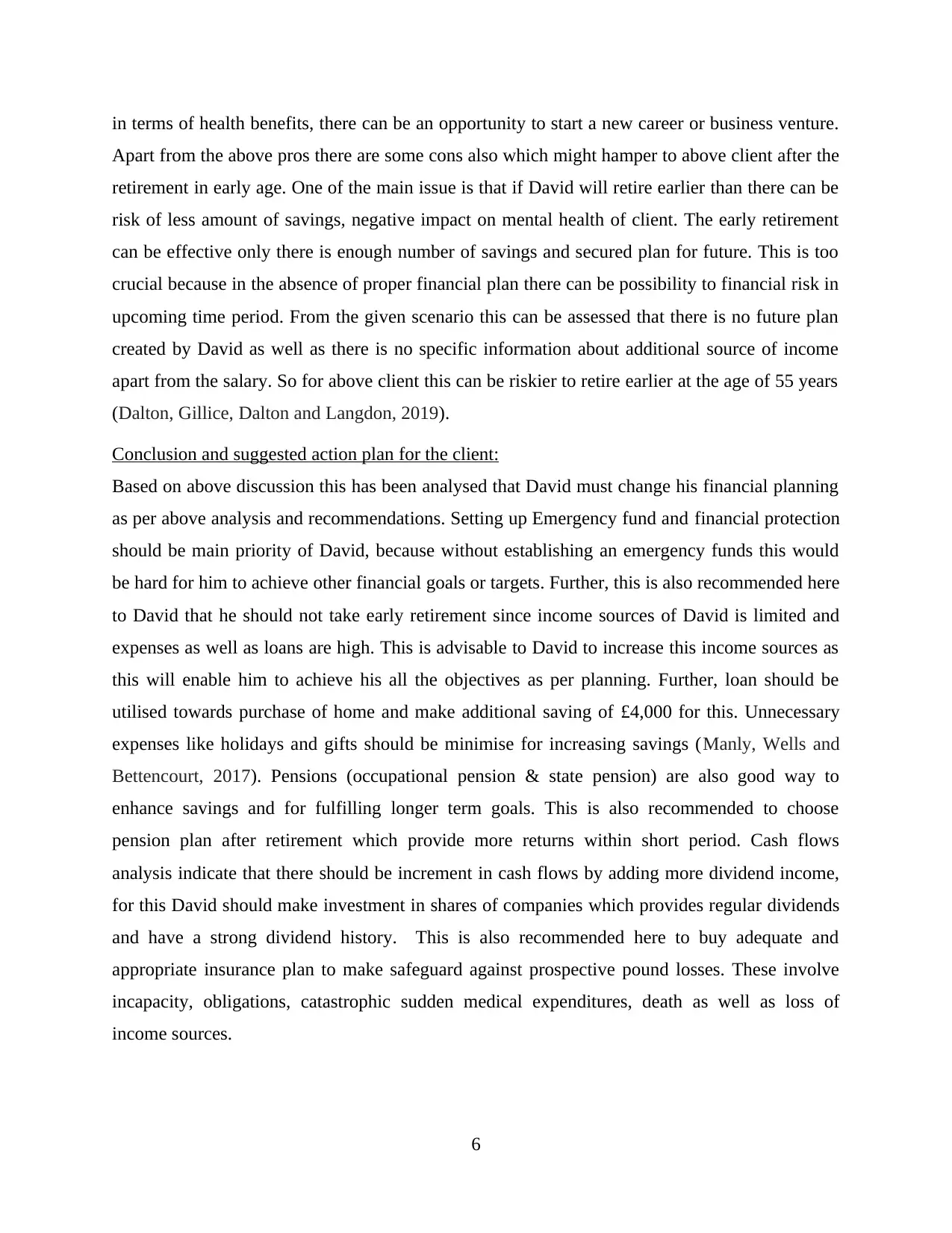
in terms of health benefits, there can be an opportunity to start a new career or business venture.
Apart from the above pros there are some cons also which might hamper to above client after the
retirement in early age. One of the main issue is that if David will retire earlier than there can be
risk of less amount of savings, negative impact on mental health of client. The early retirement
can be effective only there is enough number of savings and secured plan for future. This is too
crucial because in the absence of proper financial plan there can be possibility to financial risk in
upcoming time period. From the given scenario this can be assessed that there is no future plan
created by David as well as there is no specific information about additional source of income
apart from the salary. So for above client this can be riskier to retire earlier at the age of 55 years
(Dalton, Gillice, Dalton and Langdon, 2019).
Conclusion and suggested action plan for the client:
Based on above discussion this has been analysed that David must change his financial planning
as per above analysis and recommendations. Setting up Emergency fund and financial protection
should be main priority of David, because without establishing an emergency funds this would
be hard for him to achieve other financial goals or targets. Further, this is also recommended here
to David that he should not take early retirement since income sources of David is limited and
expenses as well as loans are high. This is advisable to David to increase this income sources as
this will enable him to achieve his all the objectives as per planning. Further, loan should be
utilised towards purchase of home and make additional saving of £4,000 for this. Unnecessary
expenses like holidays and gifts should be minimise for increasing savings (Manly, Wells and
Bettencourt, 2017). Pensions (occupational pension & state pension) are also good way to
enhance savings and for fulfilling longer term goals. This is also recommended to choose
pension plan after retirement which provide more returns within short period. Cash flows
analysis indicate that there should be increment in cash flows by adding more dividend income,
for this David should make investment in shares of companies which provides regular dividends
and have a strong dividend history. This is also recommended here to buy adequate and
appropriate insurance plan to make safeguard against prospective pound losses. These involve
incapacity, obligations, catastrophic sudden medical expenditures, death as well as loss of
income sources.
6
Apart from the above pros there are some cons also which might hamper to above client after the
retirement in early age. One of the main issue is that if David will retire earlier than there can be
risk of less amount of savings, negative impact on mental health of client. The early retirement
can be effective only there is enough number of savings and secured plan for future. This is too
crucial because in the absence of proper financial plan there can be possibility to financial risk in
upcoming time period. From the given scenario this can be assessed that there is no future plan
created by David as well as there is no specific information about additional source of income
apart from the salary. So for above client this can be riskier to retire earlier at the age of 55 years
(Dalton, Gillice, Dalton and Langdon, 2019).
Conclusion and suggested action plan for the client:
Based on above discussion this has been analysed that David must change his financial planning
as per above analysis and recommendations. Setting up Emergency fund and financial protection
should be main priority of David, because without establishing an emergency funds this would
be hard for him to achieve other financial goals or targets. Further, this is also recommended here
to David that he should not take early retirement since income sources of David is limited and
expenses as well as loans are high. This is advisable to David to increase this income sources as
this will enable him to achieve his all the objectives as per planning. Further, loan should be
utilised towards purchase of home and make additional saving of £4,000 for this. Unnecessary
expenses like holidays and gifts should be minimise for increasing savings (Manly, Wells and
Bettencourt, 2017). Pensions (occupational pension & state pension) are also good way to
enhance savings and for fulfilling longer term goals. This is also recommended to choose
pension plan after retirement which provide more returns within short period. Cash flows
analysis indicate that there should be increment in cash flows by adding more dividend income,
for this David should make investment in shares of companies which provides regular dividends
and have a strong dividend history. This is also recommended here to buy adequate and
appropriate insurance plan to make safeguard against prospective pound losses. These involve
incapacity, obligations, catastrophic sudden medical expenditures, death as well as loss of
income sources.
6
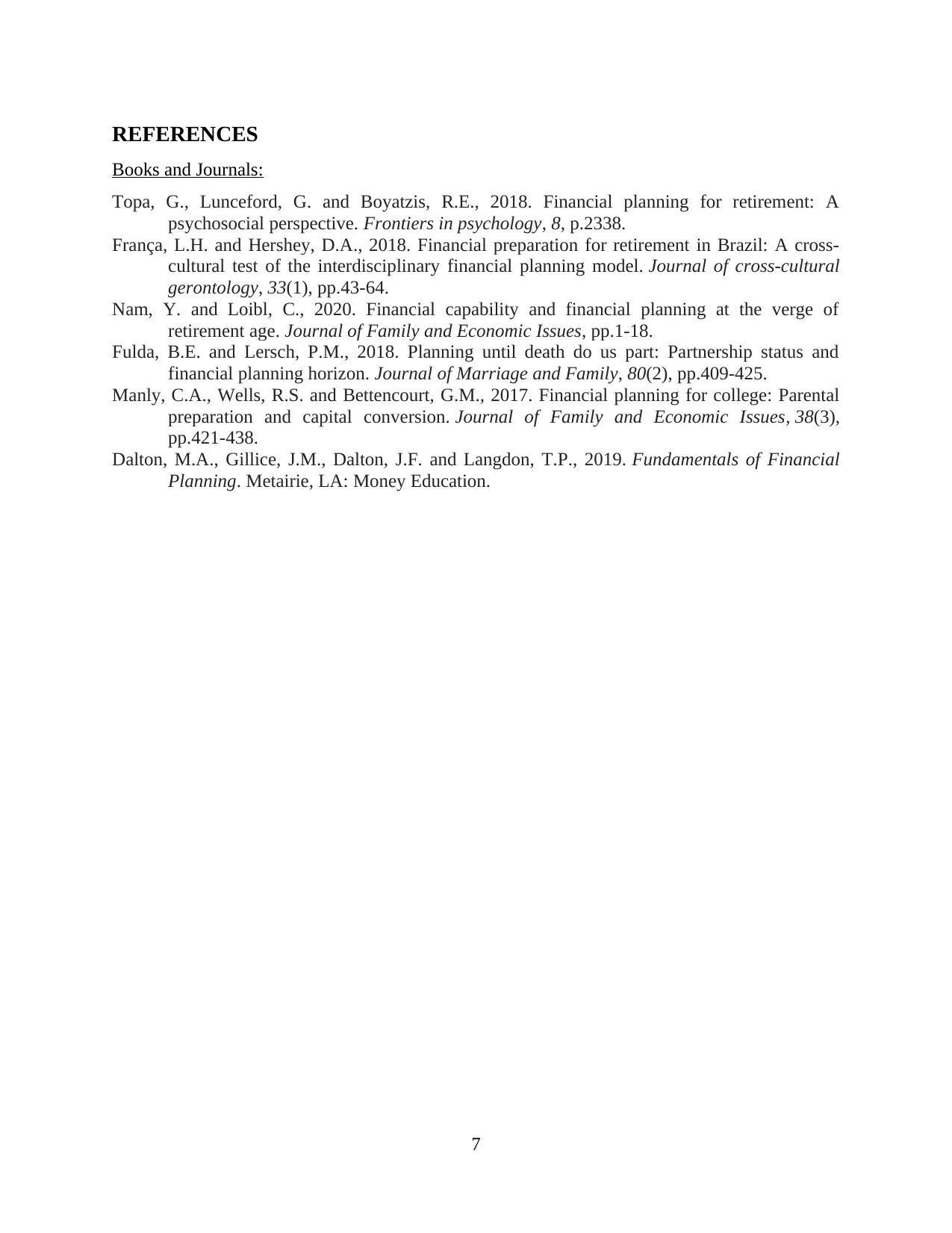
REFERENCES
Books and Journals:
Topa, G., Lunceford, G. and Boyatzis, R.E., 2018. Financial planning for retirement: A
psychosocial perspective. Frontiers in psychology, 8, p.2338.
França, L.H. and Hershey, D.A., 2018. Financial preparation for retirement in Brazil: A cross-
cultural test of the interdisciplinary financial planning model. Journal of cross-cultural
gerontology, 33(1), pp.43-64.
Nam, Y. and Loibl, C., 2020. Financial capability and financial planning at the verge of
retirement age. Journal of Family and Economic Issues, pp.1-18.
Fulda, B.E. and Lersch, P.M., 2018. Planning until death do us part: Partnership status and
financial planning horizon. Journal of Marriage and Family, 80(2), pp.409-425.
Manly, C.A., Wells, R.S. and Bettencourt, G.M., 2017. Financial planning for college: Parental
preparation and capital conversion. Journal of Family and Economic Issues, 38(3),
pp.421-438.
Dalton, M.A., Gillice, J.M., Dalton, J.F. and Langdon, T.P., 2019. Fundamentals of Financial
Planning. Metairie, LA: Money Education.
7
Books and Journals:
Topa, G., Lunceford, G. and Boyatzis, R.E., 2018. Financial planning for retirement: A
psychosocial perspective. Frontiers in psychology, 8, p.2338.
França, L.H. and Hershey, D.A., 2018. Financial preparation for retirement in Brazil: A cross-
cultural test of the interdisciplinary financial planning model. Journal of cross-cultural
gerontology, 33(1), pp.43-64.
Nam, Y. and Loibl, C., 2020. Financial capability and financial planning at the verge of
retirement age. Journal of Family and Economic Issues, pp.1-18.
Fulda, B.E. and Lersch, P.M., 2018. Planning until death do us part: Partnership status and
financial planning horizon. Journal of Marriage and Family, 80(2), pp.409-425.
Manly, C.A., Wells, R.S. and Bettencourt, G.M., 2017. Financial planning for college: Parental
preparation and capital conversion. Journal of Family and Economic Issues, 38(3),
pp.421-438.
Dalton, M.A., Gillice, J.M., Dalton, J.F. and Langdon, T.P., 2019. Fundamentals of Financial
Planning. Metairie, LA: Money Education.
7
1 out of 7
Related Documents
Your All-in-One AI-Powered Toolkit for Academic Success.
+13062052269
info@desklib.com
Available 24*7 on WhatsApp / Email
![[object Object]](/_next/static/media/star-bottom.7253800d.svg)
Unlock your academic potential
© 2024 | Zucol Services PVT LTD | All rights reserved.



